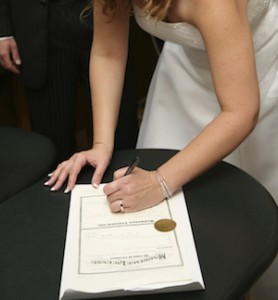Wheaton |
St. Charles |
Sycamore
 630-665-7300
630-665-7300
Marriage Requirements in the State of Illinois

If you have found "the one," the special person with whom you want to spend the rest of your life; if the ring has been purchased and your beloved has said "yes;" if you've already started planning the celebration of your big day, then an important next step is to examine the marriage requirements for the State of Illinois and make sure that you follow them before you take that trip down the aisle.
Getting the License
First, parties who intend to marry must go to the County Clerk's office in the county in which they wish to be married to obtain a marriage license. The Director of Public Health is charged with prescribing the form for a marriage license application under 750 ILCS 5/202. The application itself is pretty straightforward, but requires some very specific details about the parties. These details include:
- The name, sex, & occupation, of each party;
- Addresses;
- Social Security Numbers;
- Dates and places of birth; and
- Name and address of parents.
In addition, if either party was ever married, he or she must provide to the Director of Public Health the date and court where the marriage ended or, in the event that a party is a widow(er), the date and place of death of the former spouse.
Fees for marriage licenses in Illinois counties range from $30.00 to $60.00. Once the fee has been paid and the application itself has been filled out and signed by each party to the marriage, the county clerk will issue a marriage license. However, there will need to be proof of the following requirements before the license will issue:
- That both spouses will be 18 years or older at the time of the marriage. If either spouse is 16 or 17 years of age, he or she may marry only if they will obtain consent to marry from their parents or guardian(s), or will receive judicial approval to marry; and
- The marriage is not prohibited; meaning that the marriage is not, for example, polygamous or involving a blood relationship.
A license to marry becomes effective in the county where it was issued one day after its issuance (absent special exceptions) and expires 60 days after it becomes effective.
Who Can Officiate the Marriage?
The State of Illinois provides, by statute, many officiates capable of performing marriage ceremonies. A marriage may be solemnized by:
- A judge of a court of record;
- A retired judge of a court of record;
- A county clerk, in counties with more than two million inhabitants;
- A public official whose powers include solemnization of marriages; or
- An official of any religious denomination, nation, tribe, or native group, when done in accordance with the prescriptions of such denomination.
After the marriage has been solemnized, the certificate must be completed and forwarded to the county clerk within 10 days of the solemnization.
Prenuptial Agreements: Call an Illinois Attorney
Although most people do not go into a marriage thinking it will fail, it is always a good idea to think about how you might need to protect yourself in the future. As an individual, you have probably worked very hard to get where you are in life and it is prudent to recognize that and plan for possible hard times ahead. Perhaps you already own a home, you have a business you want to protect, or you come from a wealthier family. You may have some interest that you want to protect—and it's always better to be safe than sorry.
A prenuptial agreement can help in this situation. Such an agreement can provide security when people and relationships are at their worst. If you haven't planned ahead, you risk exposing yourself to financial problems down the road in the event your marriage breaks down. A prenuptial agreement can help define the terms of a divorce, can determine the nature of certain property and the "who gets what" of a divorce, and can help facilitate an efficient divorce resolution long before problems arise and emotions take over in a divorce action.
In the event of a divorce, if the parties have entered into a prenuptial agreement, a court will have to determine that the agreement is valid and enforceable. Therefore, it is prudent to consult with an attorney to help you draft an agreement that covers all potential areas of disagreement but that will also be enforceable in court in the future if needed. The family law attorneys at Mirabella, Kincaid, Frederick & Mirabella are well-versed in drafting prenuptial agreements and can provide guidance and protection for you in the future. Although no one plans to divorce, couples should always plan for the possibility of divorce. Call the attorneys at MKFM law today to schedule an Initial Attorney Meeting and find out how we can help protect your future.


 Read More
Read More





